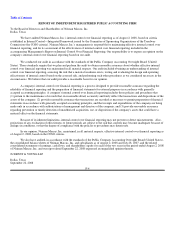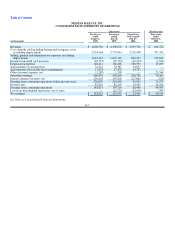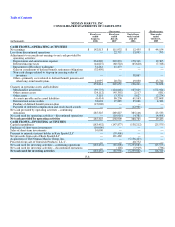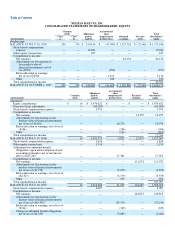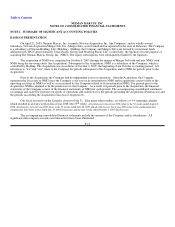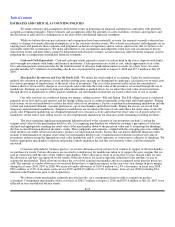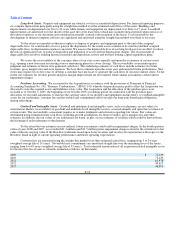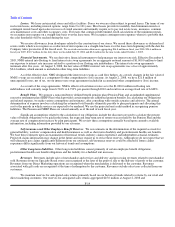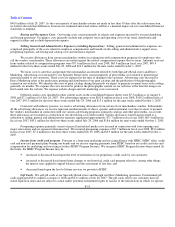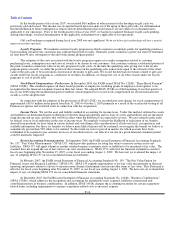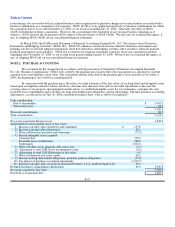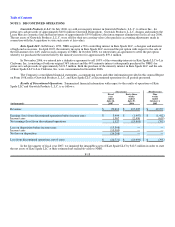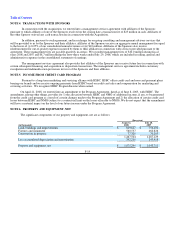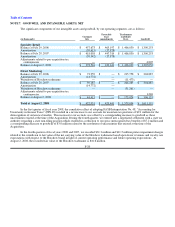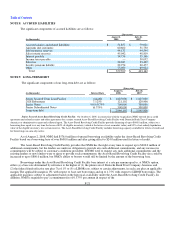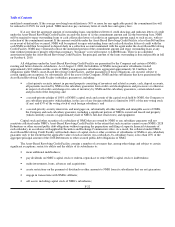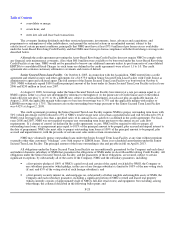Neiman Marcus 2007 Annual Report Download - page 99
Download and view the complete annual report
Please find page 99 of the 2007 Neiman Marcus annual report below. You can navigate through the pages in the report by either clicking on the pages listed below, or by using the keyword search tool below to find specific information within the annual report.
Table of Contents
Long-lived Assets. Property and equipment are stated at cost less accumulated depreciation. For financial reporting purposes,
we compute depreciation principally using the straight-line method over the estimated useful lives of the assets. Buildings and
improvements are depreciated over five to 30 years while fixtures and equipment are depreciated over three to 15 years. Leasehold
improvements are amortized over the shorter of the asset life or the lease term (which may include renewal periods when exercise of
the renewal option is at our discretion and considered reasonably assured at the inception of the lease). Costs incurred for the
development of internal computer software are capitalized and amortized using the straight-line method over three to ten years.
To the extent we remodel or otherwise replace or dispose of property and equipment prior to the end of the assigned
depreciable lives, we could realize a loss or gain on the disposition. To the extent assets continue to be used beyond their assigned
depreciable lives, no depreciation expense is incurred. We reassess the depreciable lives of our long-lived assets in an effort to reduce
the risk of significant losses or gains at disposition and utilization of assets with no depreciation charges. The reassessment of
depreciable lives involves utilizing historical remodel and disposition activity and forward-looking capital expenditure plans.
We assess the recoverability of the carrying values of our store assets annually and upon the occurrence of certain events
(e.g., opening a new store near an existing store or announcing plans for a store closing). The recoverability assessment requires
judgment and estimates of future store generated cash flows. The underlying estimates of cash flows include estimates for future
revenues, gross margin rates and store expenses. We base these estimates upon the stores' past and expected future performance. New
stores may require two to five years to develop a customer base necessary to generate the cash flows of our more mature stores. To the
extent our estimates for revenue growth and gross margin improvement are not realized, future annual assessments could result in
impairment charges.
Purchase Accounting. We accounted for the Acquisition in accordance with the provisions of Statement of Financial
Accounting Standards No. 141, "Business Combinations," (SFAS 141) whereby the purchase price paid to effect the Acquisition was
allocated to state the acquired assets and liabilities at fair value. The Acquisition and the allocation of the purchase price were
recorded as of October 1, 2005, the beginning of our October 2005 accounting period. In connection with the purchase price
allocation, we recorded adjustments to increase the carrying value of our property and equipment and inventory, to establish intangible
assets for our tradenames, customer lists and favorable lease commitments and to revalue our long-term benefit plan obligations,
among other things.
Goodwill and Intangible Assets. Goodwill and indefinite-lived intangible assets, such as tradenames, are not subject to
amortization. Rather, recoverability of goodwill and indefinite-lived intangible assets is assessed annually and upon the occurrence of
certain events. The recoverability assessment requires us to make judgments and estimates regarding fair values. Fair values are
determined using estimated future cash flows, including growth assumptions for future revenues, gross margin rates and other
estimates. In addition, the fair values of our tradenames are based, in part, on our estimates of royalties which could be derived from
the licensing of such tradenames to third parties.
To the extent that our estimates are not realized, future assessments could result in impairment charges. In the fourth quarters
of fiscal years 2008 and 2007, we recorded $31.3 million and $11.5 million pretax impairment charges related to the writedown to fair
value of the net carrying value of the Horchow tradename based upon lower revenues and royalty rate expectations with respect to the
Horchow brand in light of current operating performance and future operating expectations.
Customer lists are amortized using the straight-line method over their estimated useful lives, ranging from 5 to 24 years
(weighted average life of 13 years). Favorable lease commitments are amortized straight-line over the remaining lives of the leases,
ranging from 6 to 49 years (weighted average life of 33 years). Total estimated amortization of all acquisition-related intangible assets
for the next five fiscal years is currently estimated as follows (in thousands):
2009 $ 72,149
2010 72,149
2011 61,438
2012 49,013
2013 46,881
F-13


